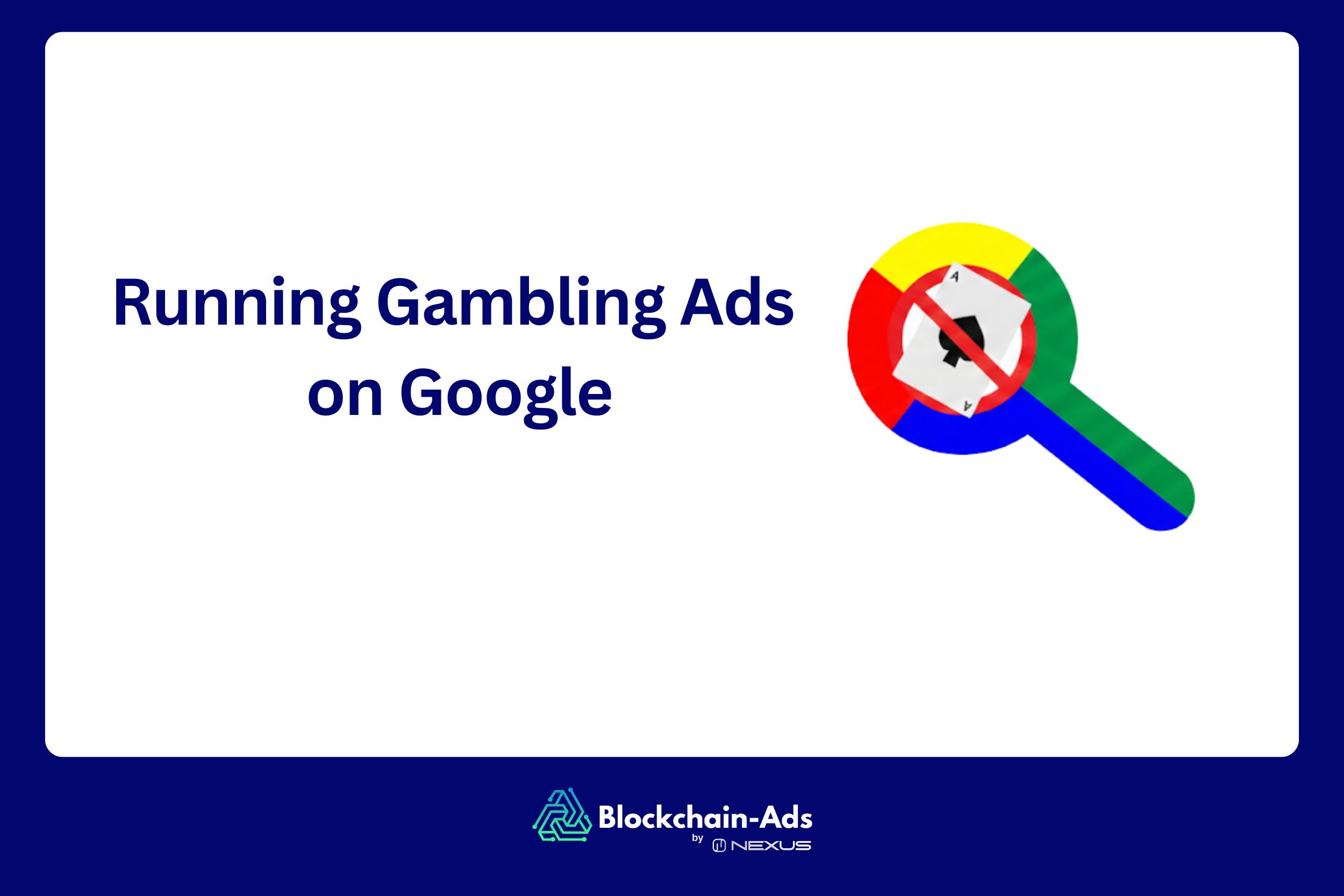世界各国のiGaming規制【EU、米国、アジア、アフリカ】
iGamingとは、オンラインベッティングおよびギャンブル活動を定義する用語であり、カジュアルなプレイから実際の金銭を賭けるものまで含まれます。その複雑な規制の枠組みにより、iGamingを理解することは、広告主がキャンペーンを開始する前に対処しなければならない課題となっています。
以下の主要市場におけるiGaming規制について知っておくべき内容をご紹介いたします:
- EU(欧州連合)
- 中央・東欧
- 北米
- オーストラリア・ニュージーランド
- アジア
- 南米
- 中東
- アフリカ
EUにおけるiGaming規制環境は高度に発展していますが、国ごとに法律が大きく異なります。
例えば英国では、iGaming業界は英国賭博委員会が監督する最も包括的な規制枠組みの一つを有しています。一方、マルタはiGamingに友好的な主要国として認識されており、その一因として好ましい規制環境があります。ドイツとウクライナも中央・東欧における巨大市場となっています。
北米の規制状況はまったく異なります。米国では各州がオンラインギャンブルを自主規制できるのに対し、カナダは統一的なアプローチを採用しています。このアプローチにより、オンタリオ州などの州が規制されたiGaming市場を開設することが可能となっています。
オーストラリアとニュージーランドも異なるアプローチを採用しており、オーストラリアは国内事業者によるオンラインカジノの開設を禁止していますが、スポーツベッティングは許可しています。ニュージーランドは、自国領内でのオンラインカジノの運営を制限していますが、自国民が海外のウェブサイトでギャンブルをすることは認めています。
欧州と同様に、アジアも多様な規制状況を有しており、中国や韓国のように厳格な禁止措置を維持している国がある一方で、フィリピンのようにiGaming規制を全面的に受け入れている国もあります。
南米では、コロンビアが包括的な枠組みを構築していることから、iGaming規制の状況は絶えず変化しています。
他の地域とは異なり、中東はオンラインギャンブルに対して制限的な政策を採用していますが、いくつかの例外があります。
アフリカ諸国はiGaming規制と枠組みにおいて遅れているように見えます。それでも、南アフリカのような国々はオンラインスポーツベッティングを合法化する措置を講じています。
地域における法的枠組みの多様性、あるいはその欠如を考慮すると、世界のiGaming業界を理解することは困難であり、特にギャンブル広告キャンペーンを計画・開始する際には難しい課題となります。
南米、アフリカ、アジアの一部における新興市場は潜在的な機会を提供していますが、独自の規制上の課題がないわけではありません。
本記事では、世界の規制に関する重要な知見を提供し、iGaming事業者や広告主の皆様が、コンプライアンスを遵守した効果的なマーケティング戦略を構築できるよう支援いたします。
EUにおけるiGaming規制
EU内の各国は異なる規制と法律を設けているため、広告主は常にルールを把握しておくことが不可欠です。
英国のiGaming規制について
英国のオンラインギャンブル法は世界で最も厳格なものの一つであり、そのためUKGCライセンスは最も求められるライセンスの一つとなっています。オンラインギャンブルは英国内で主流の余暇活動と見なされており、その結果、潜在的なプレイヤーに多様な選択肢が提供されています。
これを踏まえ、英国は2005年賭博法を導入しました。この法律は、すべてのギャンブル運営が透明かつ公正に行われることを保証する枠組みを提供しています。この法律は英国賭博委員会によって監督されており、責任あるギャンブル慣行の実施も確保しています。
iGaming事業者は以下を行う必要があります:
- 高度な顧客認証ツールとプロセスを利用する
- 自己排除と支出制限のオプションを提供する
- ギャンブルのリスクについて消費者に情報を提供するための厳格な広告規則を遵守する
この包括的なアプローチは、iGamingの経済的利益と社会福祉のバランスを取るのに役立ちます。
マルタのiGaming規制について
マルタは、2004年に実施を開始した革新的で堅牢な枠組みにより、iGaming管轄において重要な役割を果たしています。マルタゲーミング当局は遠隔ゲーミング規制によって創設され、マルタはオンラインカジノを規制する最初のEU加盟国となりました。この法律は現在、より更新された関連性の高い法律であるゲーミング法に置き換えられています。
マルタ、ひいてはマルタゲーミング当局が業界のリーダーと見なされている理由はいくつかあります。一つには、マルタの規制環境は他国よりも安定し発展しており、MGAはライセンシーに明確なガイドラインを提供しています。
この島国はまた、競争力のあるゲーミング税と法人税率を提供しており、これらは通常、他の管轄区域よりも低く設定されています。iGaming規制を創設した最初の国の一つとして、マルタは業界で重要な位置を占めています。
北欧諸国のiGaming規制について
欧州の他の国々がすでに既存の枠組みを持ち、それらを更新しようとしている一方で、北欧市場は大きく遅れをとっています。現状では、デンマーク、ノルウェー、フィンランド、スウェーデンには広範なiGaming規制政策がありません。
これらの国々は、ライセンスシステムを持たないフィンランドを除いて、自国領域外のiGaming事業者にライセンスを提供していません。しかし、デンマークは自国民がオフショアのiGamingプラットフォームを訪問することを認めています。
それでも、iGaming業界から立法改革を求める圧力が高まっています。各国の立法機関は、欧州の他の地域と密接に一致する更新された枠組みの導入を検討しており、フィンランドは2026年にようやくライセンスシステムを創設します。
ノルウェーとデンマークの両国の議員は、それぞれのライセンスシステムをオフショア事業体に開放する法案を提案しています。これは、北欧諸国が他の地域で利用可能な規制に追いつくのは時間の問題であることを示しています。
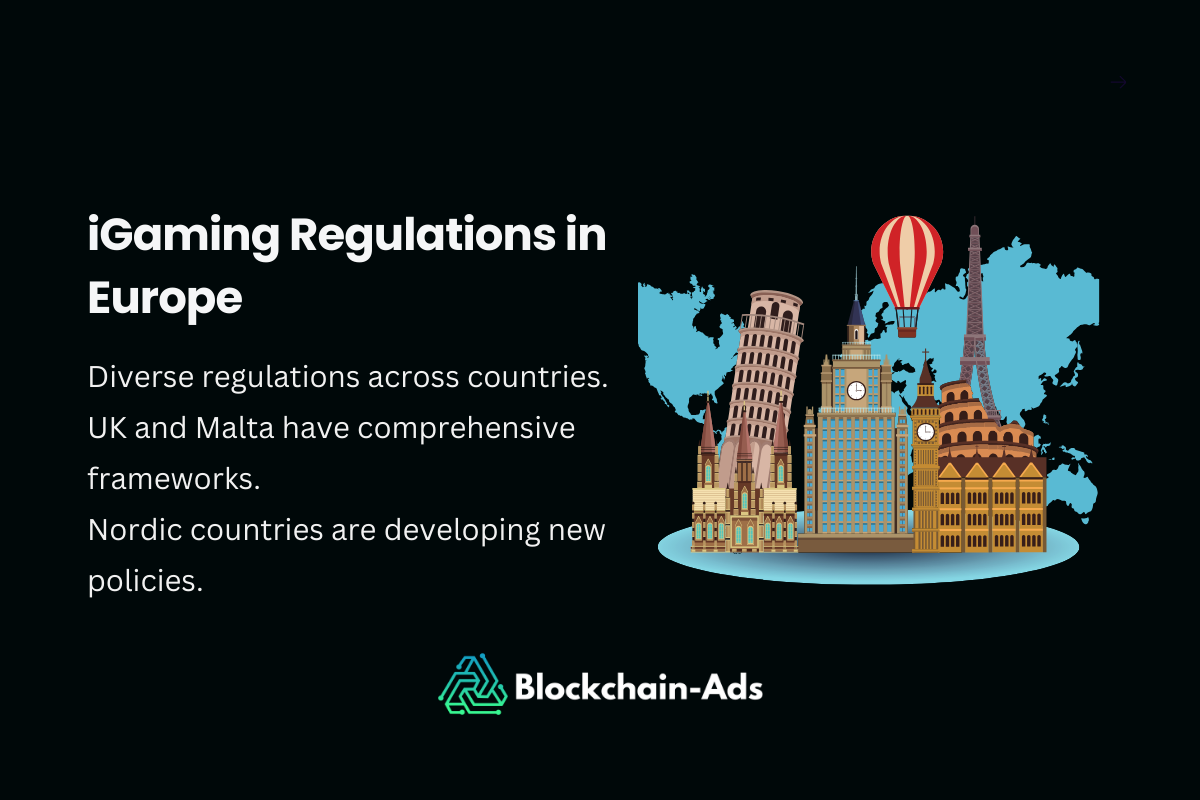
中央・東欧におけるiGaming規制
中央・東欧のiGaming規制は国によって大きく異なり、一部の国は規制市場を受け入れている一方で、他の国はより厳格な管理を維持しています。以下の表は、この地域のいくつかの国における法的地位と主要規制の概要を示しています:
最近iGaming法を自由化したドイツは、州際ギャンブル条約(Glücksspielstaatsvertrag)に基づいて、オンラインカジノゲーム、ポーカー、スポーツベッティングのライセンスを認めるようになりました。
事業者は国家規制当局であるGlücksspielbehördeからライセンスを取得し、広告、プレイヤー保護、責任あるゲーミングに関する厳格な規則を遵守する必要があります。
ポーランドはより制限的なアプローチを維持しており、オンラインギャンブルは主に国家独占によって管理されています。この状況は、法律を緩和することで地元のギャンブル業界が繁栄できると主張する準拠事業者の間で不満を引き起こしています。
チェコ共和国は2017年ギャンブル法を通じて市場を規制しており、この法律は事業者に対するより厳格なライセンス要件を導入し、ギャンブル活動に対して23%の税率を課しています。
ハンガリーは、2023年1月1日から有効な新しいライセンス制度により、最近市場を開放しました。申請者は、欧州経済地域内で少なくとも5年間のライセンスを持つオンラインゲーム経験を実証する必要があります。規制枠組みには、申請料、最低登録資本、ライセンス料、総収入に対する税金などの財政的義務が含まれています。
ウクライナは11年間の禁止後、2020年にギャンブルを合法化し、オンラインと陸上ベースの両方の運営を許可しました。しかし、市場は高額なライセンス料と複雑な税制構造のために課題に直面しており、これが事業者を規制されていない市場に追いやる可能性があると一部では主張されています。
ロシアは厳格な規制を維持しており、オンラインギャンブルはライセンスを持つ事業者を通じたスポーツベッティングを除いて大部分が禁止されています。
ルーマニアは十分に規制された市場を持ち、オンラインギャンブルは合法で規制されています。事業者は国家ギャンブル局からライセンスを取得する必要があり、地元および外国の事業者の両方がライセンスを申請できます。
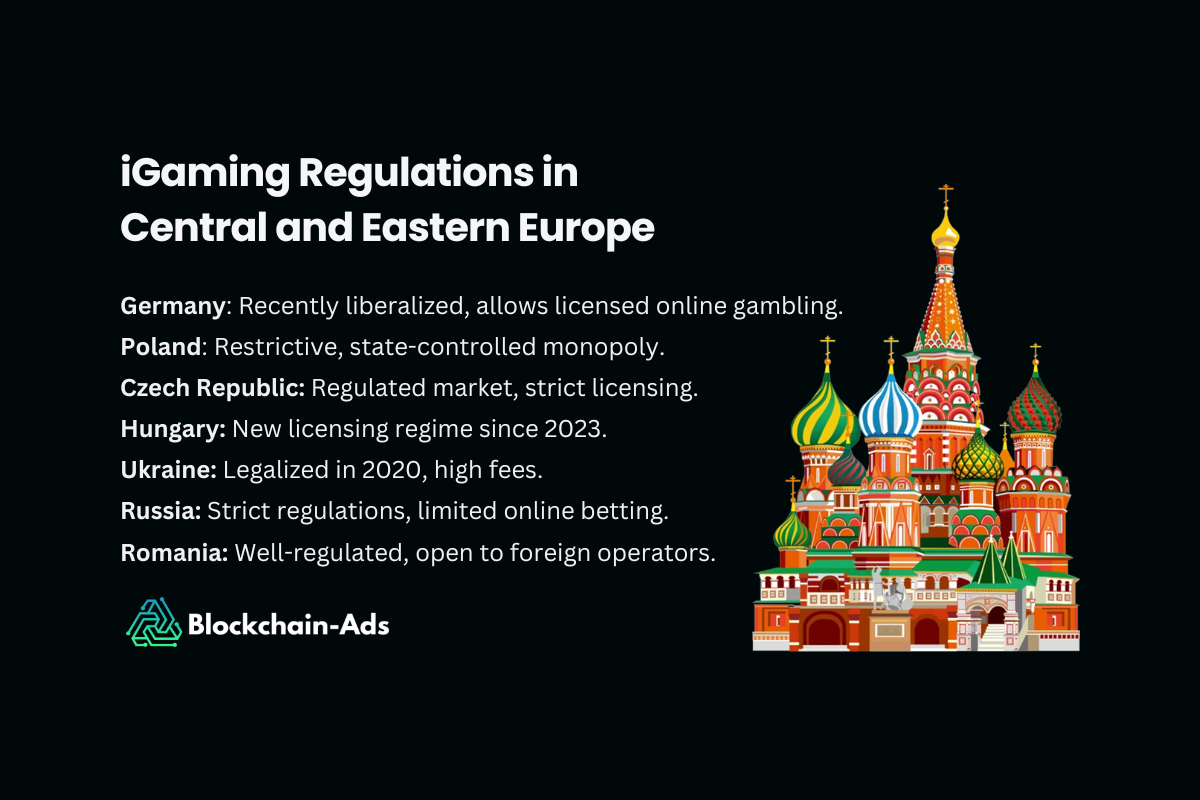
北米におけるiGaming規制
米国とカナダはiGaming規制に対して類似したアプローチを採用しています。連邦レベルで包括的な枠組みを確立するのではなく、立法は州と地域に委ねられています。
しかし、類似点はここまでです。米国の現行法はオンラインベッティングとカジノを禁止している一方で、各州が独自の決定を下すことを認めています。一方カナダは自由放任主義的なアプローチを取り、各州と準州が全体的な政策に適合する枠組みを構築できるようにしています。
米国のiGaming規制について
米国は、州政府と連邦政府の両方が役割を果たす複雑なシステムを通じてiGamingを規制しています。連邦法は一般的なガイドラインを確立している一方で、各州が独自のギャンブル規制を決定します。
1961年連邦ワイヤー法は、有線通信を介した州際スポーツベッティングを禁止することにより、当初オンラインギャンブルの合法性を複雑にしました。これは2006年違法インターネットギャンブル施行法によって明確化され、金融機関が違法なオンラインギャンブルの取引を処理することを禁止していますが、合法性の定義は個々の州に委ねられています。これにより、州はiGamingを合法化し、自州内での金融取引を許可できます。
さらに、連邦政府はマネーロンダリング防止法と消費者保護法を施行しています。オンラインギャンブルを合法化した州には以下が含まれます:
- ニュージャージー
- ネバダ
- ペンシルベニア
- デラウェア
- ミシガン
- ウェストバージニア
業界関係者は、他の州が追随するのは時間の問題だと考えています。
カナダのiGaming規制について
1960年代以降、カナダの各州はギャンブルに関する独自の規制を導入できるようになりました。当時、焦点は宝くじシステムと陸上カジノにありました。
しかし、インターネットの導入により、多くの州はオンラインギャンブルプラットフォームを規制する必要性を認識しました。その結果、iGaming規制が州ごとに異なる国となっています。
各州の規制の違いにより、カナダには連邦ライセンスシステムがありません。連邦政府は代わりに、ギャンブル事業者にライセンスを与える権限を各州に付与しています。
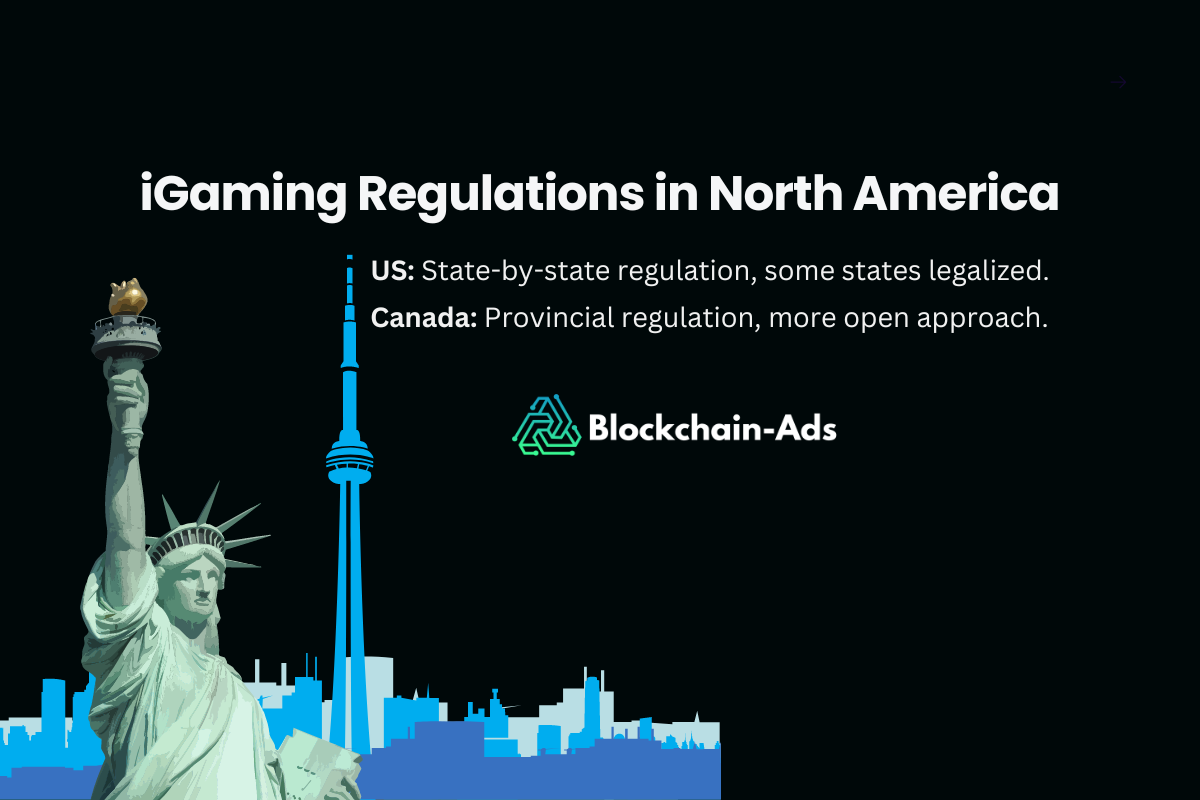
オーストラリアとニュージーランドにおけるiGaming規制
オーストラリアとニュージーランドは、包括的な政策を持たずに、iGamingに対して異なる規制アプローチを採用しています。
オーストラリアはiGaming規制を州・準州政府に委任しており、それぞれが独自の法律を設定しています。
国家規制機関はありませんが、2001年インタラクティブギャンブル法は、オフショアのオンラインカジノがオーストラリア居住者にサービスを提供することを禁止していますが、スポーツベッティングと宝くじは許可しています。
ニュージーランドは2003年ギャンブル法に基づいてすべてのiGamingを規制しており、TABとLotto NZを除き、地元のiGamingサイトを禁止しています。ただし、ニュージーランド人は合法的に外国のサイトを利用でき、賞金に課税されません。
両国は消費者保護と責任あるギャンブルを重視しており、広告制限を含め、被害を最小限に抑え、脆弱な人々を保護することを目指しています。
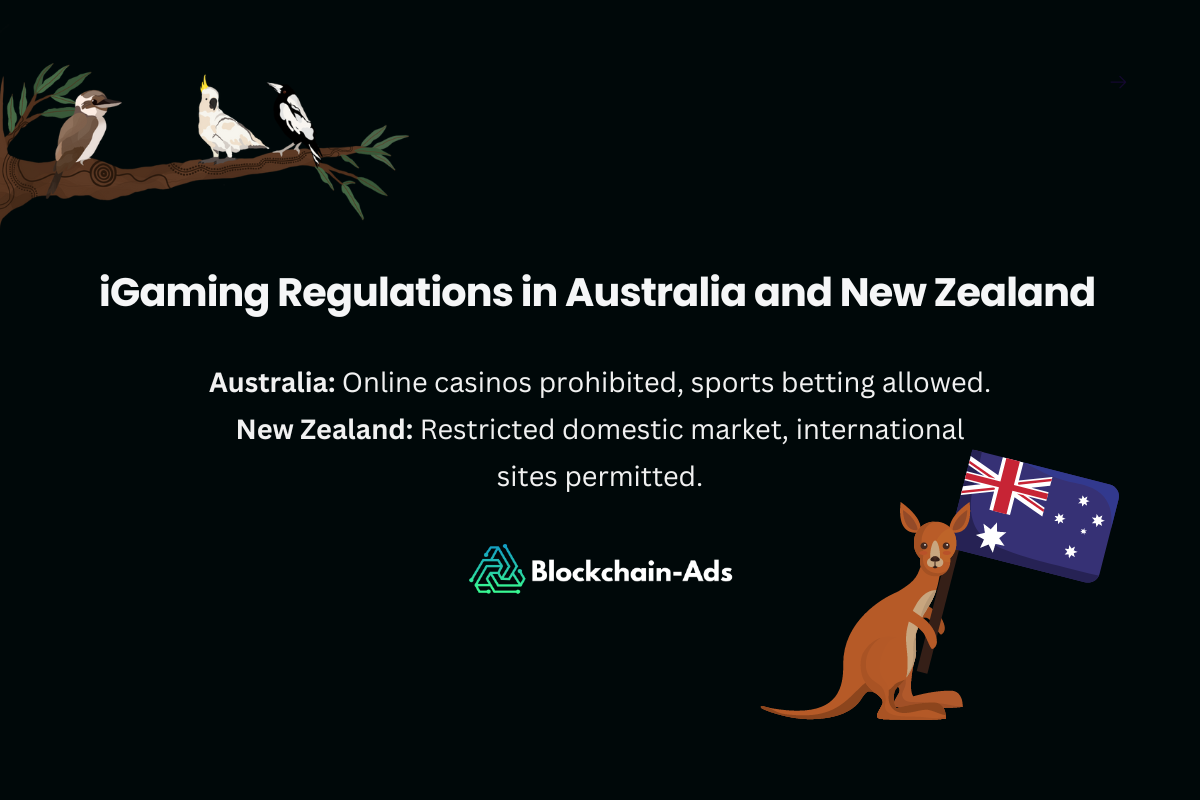
アジアにおけるiGaming規制
アジアのiGaming規制は大きく異なります。以下は、この地域の主要市場における規制の簡単な概要です。
日本には厳格な規制があり、一般的にiGamingを禁止していますが、最近規制された統合型リゾートを検討しており、宝くじとスポーツベッティングに焦点を当て、消費者保護とギャンブル依存症の防止を強く重視しています。
対照的に、フィリピンは堅牢で規制されたiGaming業界を有しており、オフショアプラットフォームにもライセンスを発行しています。インドは断片的な規制状況を呈しており、ゴアやシッキムなどの州が、国家的な枠組みがない中で規制されたオンラインゲーミングの提供をリードしています。
この断片的なアプローチは、iGamingの需要が高まるにつれて、より標準化された連邦規制を促す可能性があります。
アジアにおける広告の課題は、厳格な規制と文化的な配慮により重要です。シンガポール、マレーシア、インドの一部の州など多くの場所では、オンラインギャンブルが禁止されており、iGaming広告が制限されているか完全に禁止されており、違反には法的結果が生じる可能性があります。
オンライン広告は、中国や日本などの国で見られるように、検閲や文化的配慮により制限を受けています。

南米におけるiGaming規制
南米のiGaming規制は、この地域の国々と同じくらい多様です。コロンビアやブラジルなどの国々は、積極的な法律でこの地域をリードしています。この地域の他の国々は、消費者を保護しながら市場の安定性を促進することを目指しています。
モバイルプラットフォームの広範な採用により、この地域のより多くの国がiGaming規制を正式化することが期待されています。
この地域の主要市場における規制の簡単な概要:
コロンビアはiGaming規制のリーダーであり、2016年に初めてオンラインギャンブルを完全に合法化し規制した地域の国でした。
規制機関を通じて、国はギャンブルビジネスがスポーツベッティング、オンラインカジノ、ポーカーを提供するための明確に定義されたライセンス枠組みを提供しています。この枠組みは、消費者保護を提供しながら税収を増やすための素晴らしい方法です。
ブラジルは2018年にオンラインスポーツベッティングを合法化しましたが、完全な規制はまだ開発中です。チリやペルーなどの他の国もiGamingを合法化していますが、必要な枠組みは開発中です。
中東におけるiGaming規制
中東では合法化されたiGamingは稀ですが、限定的な形態でそれを許可している国があります。モロッコとレバノンが最も自由化されたiGaming法を提供していますが、これらは世界の他の地域で開発された枠組みには及びません。以下は、中東の主要市場におけるiGaming規制の状況です:
前述のように、中東全域でオンラインベッティングは許可されておらず、ほとんどの国はこれを変更することにほとんど関心を示していません。これは文化的および宗教的な理由によるものであり、この地域のほとんどで陸上カジノも違法です。
それでも、これらの法律は国民が外国のサイトで賭けをすることを止めていません。
アフリカにおけるiGaming規制
アフリカの主要市場におけるiGaming規制について知っておくべきことは以下の通りです:
南アフリカ、ケニア、ナイジェリアのiGaming市場は現在急速な成長を遂げています。この成長は、インターネット普及率の向上、スマートフォンの採用、若い人口によって推進されています。
南アフリカは複雑ですが規制された業界を持っています。各州がその管轄内の事業者に規制とライセンスを発行する一方で、国家ギャンブル委員会がセクターを監督し、事業者が厳格な規制に準拠することを確保しています。
ケニアは、スポーツベッティングのおかげで東アフリカの主要なiGamingハブになっています。斬新なモバイル決済システムの結果、国のiGaming業界は指数関数的な成長を遂げました。しかし、業界は規制の厳格化と課税の増加に悩まされており、その成長を鈍化させています。
ナイジェリアのiGaming業界は急成長しており、国の人口は潜在的なプレイヤーの大きなプールを提供しています。国家宝くじ規制委員会がセクターを監督していますが、規制の実施と違法事業者の閉鎖には課題があります。
グローバルiGaming市場の規制について広告主が知っておくべきこと
iGaming市場の予測価値が2024年に970億ドルに達することから、広告主はさまざまな地域における異なる規制を認識する必要があります。特に関連する規制機関がライセンスを提供する場合、政策の無知は言い訳にはなりません。
一部の国はすべての形態のオンラインギャンブルを許可している一方で、他の国はスポーツベッティングやオンラインカジノなどの特定の活動を制限または完全に禁止しています。これらの枠組みを理解することは、運営停止、評判の損傷、重い罰金を避けるために不可欠です。
iGaming広告主はまた、運営を目指す各市場の特定の要件を熟知している必要があります。例えば、英国賭博委員会は最も厳格な規制当局の一つであり、事業者に責任あるゲーミングメッセージ、明確な広告、特定のハイリスクグループをターゲットにすることに関する制限を提供することを義務付けています。
ライセンス要件は広告主にどのように影響しますか?
ライセンス要件は、iGaming広告主がギャンブルプラットフォームを宣伝できる場所と方法を直接決定します。規制市場では、これらの広告主はライセンスを持つ事業者のみが宣伝されることを確保する必要があります。
例えば、規制が州によって異なる米国では、広告主は広告する際に極めて慎重である必要があります。このため、彼らはiGamingが合法な州でのみオンラインベッティングを宣伝する必要があります。
UKGCのような一部の規制当局は、ギャンブル広告に関するガイドラインも持っています。一つには、リスクグループや未成年者をターゲットにすることは禁止されています。iGaming広告は、ウォーターシェッド(未成年者がテレビを見ている可能性のある時間)前にも禁止されています。
明確に定義されたガイドラインがない管轄区域では、典型的な広告上の懸念が適用されます。未成年者や脆弱な個人をターゲットにしないなどのコンテンツ制限規則が適用されます。
他の多くの管轄区域でも、iGaming広告が勝利の可能性を誇張しないことを要求しています。自己排除オプションや依存症ヘルプサービス情報などの責任あるギャンブルメッセージを広告に含める必要があります。これを怠ると、閉鎖、罰金、またはライセンスの取り消しにつながる可能性があります。
グレーまたは規制されていない市場で広告することのリスクは何ですか?
グレーまたは規制されていない市場でiGamingを広告するリスクには以下が含まれます:
- 法的結果:広告主は、将来これらの市場でiGamingが犯罪化された場合、罰金、法的措置、または運営制限に直面する可能性があります。
- 評判の損傷:ブランドは、法律で要求されていない場合でも、責任あるギャンブル対策の実施に失敗した場合、評判を損ない、消費者の間で否定的な認識を生み出すリスクがあります。
- プラットフォームポリシー違反:広告主は、ギャンブル関連の広告を厳しく規制または制限するTikTok、Facebook、Googleなどの主要な広告プラットフォームの厳格なポリシーに準拠することに苦労する可能性があります。
複雑な規制環境におけるiGaming広告のベストプラクティスは何ですか?
iGaming広告の状況をナビゲートするには、さまざまな規制と消費者保護に準拠するための戦略的アプローチが必要です。主要なベストプラクティスは以下の通りです:
- 規制状況の理解:地域の規制について常に情報を入手し、規制市場と非規制市場の両方でキャンペーンが準拠していることを確認します。
- 責任あるギャンブルイニシアティブの遵守:自己排除、依存症予防、安全なプレイに関するメッセージを広告に含めることで、責任あるギャンブルを促進します。
- プラットフォーム固有の広告ポリシーへの準拠:各プラットフォーム(Google、Facebookなど)には、ギャンブル広告に関する特定の規則があります。キャンペーンがこれらの要件を満たしていることを確認してください。
- 攻撃的でないマーケティング戦術の使用:潜在的な勝利や結果を誇張しないでください。代わりに、ギャンブルを責任ある娯楽活動として宣伝してください。
- Blockchain-Adsでのジオターゲティングの活用:専門広告ネットワーク、Blockchain-Adsなどを使用してジオターゲティングを行います。これにより、規制地域に広告を集中させ、規制されていない地域での法的リスクを軽減できます。
広告主が注目すべき新興市場は?
iGaming広告主は、現在および予測される成長により、いくつかの新興市場に細心の注意を払う必要があります。以下はいくつかの例です:
- コロンビア:iGamingの規制枠組みを実施し、市場の大幅な成長につながりました。
- ペルー:2022年にオンラインギャンブル市場を規制し、大幅な成長をもたらしました。
- ブラジル:膨大な人口と発展途上の立法環境により、ブラジルは注目すべき重要な市場です。
- ケニア:モバイル決済とインターネットアクセスの増加がiGamingセクターの成長を推進しています。
- 南アフリカ:接続性の向上とモバイルゲーミングの採用に支えられた成長市場。
- ナイジェリア:インターネットアクセスとモバイル決済の増加が国内のiGaming活動を促進しています。
- カナダ(オンタリオ):iGaming市場を規制した後、オンタリオは運営2年目に約27億ドルの収益を生み出しました。
結論:iGaming広告主のための重要なポイント
iGaming業界は、特に世界の特定の地域において指数関数的な成長が見込まれています。それに伴い、広告主はiGaming規制の状況をナビゲートするには徹底的なアプローチが必要であることを理解する必要があります。
これは、明確に定義された政策と規制を提供する市場を認識することを意味します。また、グレー市場として分類できる市場を理解することも意味します。全体として、広告する際、iGaming広告主はライセンス要件や責任あるゲーミングなどの他の要因を考慮する必要があります。
資格を取得してアクセスする ブロックチェーン広告
ロレム・イプサム・ドロール・サイト・アメット、コネクター
Bettors deposit $95B+ yearly—how much are you capturing?
The iGaming market grows 11% every year. Your competitors are already scaling. You should too
現在のパートナーの何人かと話してください
すべての成功事例を見る

1200万以上にリーチ
10,000以上のウェブサイトと37のブロックチェーンでWeb3ユーザーをエンゲージしました。






.png)




